NAWA entered 2020 with a wide variety of plans. Yet, just as many others, we too were forced to change them. The COVID-19 pandemic, which we have been facing since mid-March, significantly affected higher education and international exchange. The last six months were an extremely difficult time, but also a time when, despite everything, a great deal happened at NAWA.
We have prepared a short summary of this intense period, in which our Agency’s staff worked with zeal for the benefit of students, scientists and institutions and promoted Polish research and the higher education system abroad.
The first half of the year was the period when we announced calls for applications in 19 NAWA programmes! This number included seven programmes for scientists, two for institutions, four programmes devoted to the Polish language and five dedicated to students. Universities can also apply fur funding under a new programme: "Programme Preparatory Courses for Studying in Poland". The objective of the programme is to organise and carry out an introductory course for foreigners before they take up studies in Poland.
The calls in 14 programmes closed by 30 June. We are still accepting submissions in five remaining calls.
When the state of epidemic was declared, we postponed the deadlines in the open calls in order to respond to the needs of scientists, students and higher education institutions. For instance, more time to provide all necessary documents was offered to scientists interested in the Polish Returns or the Ulam Programme, to foreign students applying under the Poland My First Choice programme or to universities willing to participate in the KATAMARAN programme.
What are the statistics in the already closed calls? It could seem that, on account of the uncertain situation, the number of submitted applications in this year’s editions would drop. It is quite the opposite! The period of the lockdown turned out to be also a time for the potential beneficiaries to plan their next year’s activities. In fact, projects funded from most programmes will be launched only in 2021.
In total, 7053 applications were submitted in all ongoing programmes. The greatest number of applications – as many as 4656 – were submitted in programmes for foreign students. Particularly noteworthy is the Lukasiewicz Scholarship Programme with an almost fivefold increase in the number of submissions as compared to 2019: as many as 2344 candidates applied for funding. Twice as many applications compared to last year were submitted under the Gen. Anders Programme for second-cycle studies for the Polish diaspora, with their number reaching 616. The number of applications in the second edition of the incoming Poland My First Choice programme likewise nearly doubled. The majority of the 82 applicants came from Italy, France and the USA. The number of applications submitted in the remaining programmes dedicated to students was similar to last year.
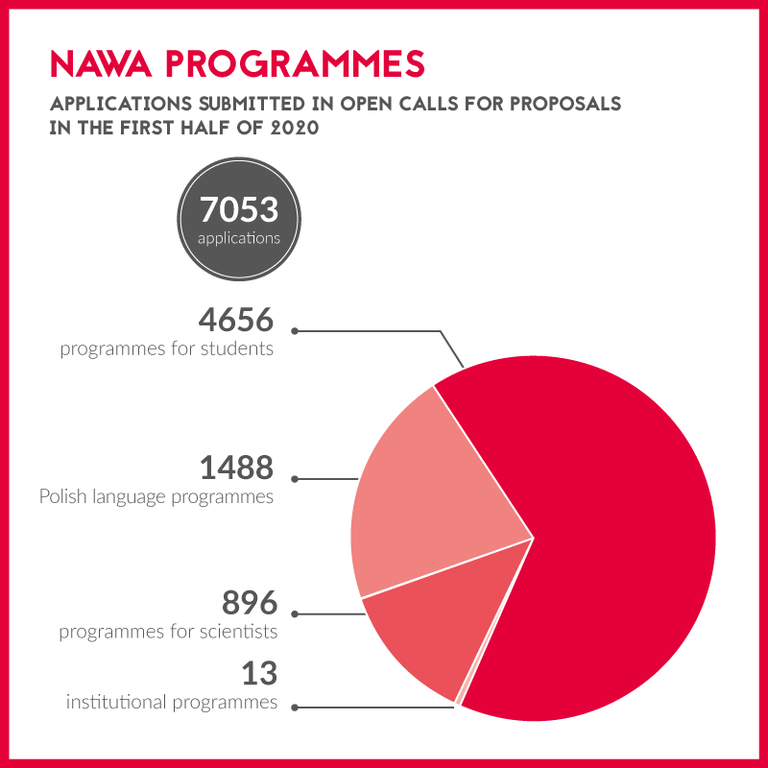
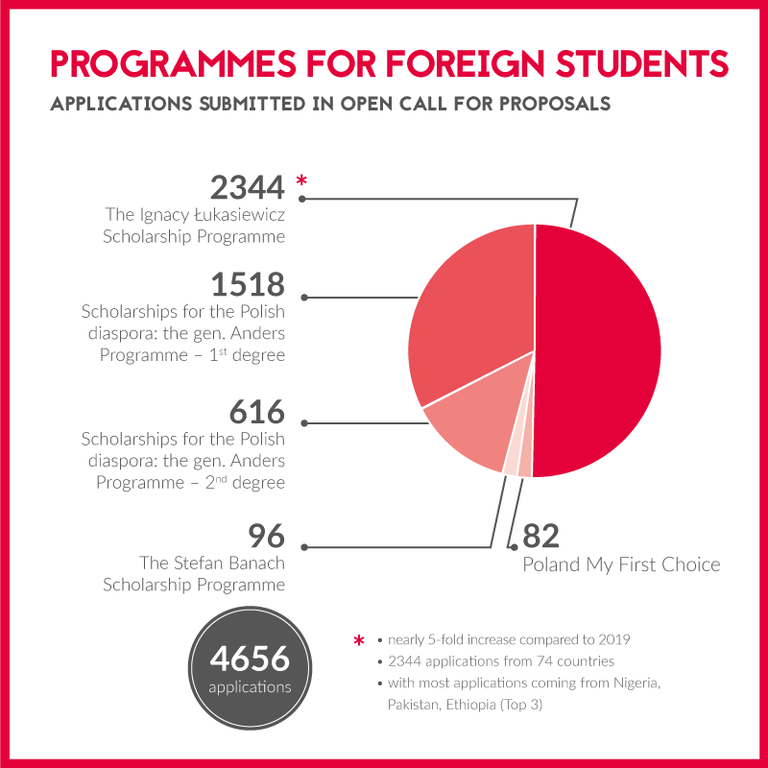
The second most popular group of programmes judging by the number of registered candidates are the Polish language programmes. Here, most of the 1488 applications came from persons interested in the Polish language and culture summer courses.
Unfortunately, the programme, which has been very popular from the outset, could not be carried out this year due to the pandemic. However, we did not leave those who wish to increase their language competence and are interested in the Polish culture without an alternative. Applicants from almost all over the world (we received submissions from 78 countries) were given the opportunity to participate in online courses. As for the POLONISTA Programme, which was offered in a modified form this year, we received 90 submissions. The new element in the programme is the possibility to finance research projects of scientists interested in the Polish literature, culture, history and language. Twenty-two applications were submitted in this group. They came from scientists and students from among others Argentina, Belarus, Brazil, China, Czechia, France, India, Kazakhstan, Russia, Turkey, Ukraine, the US and Italy.
We received 896 applications in programmes for scientists. Among them, 61 were made for the Polish Returns programme by scientists of Polish origin who carry out research abroad. Thanks to an agreement with the National Science Centre in Poland, the Polish Returns programme was enhanced with the research component – a starting grant for basic research within the first 18 months of work by the returning scientist and their team. Most submissions came from the UK, the US and Germany. As many as 348 scientists from abroad applied for scholarships for research visits in Poland under the Ulam Programme.
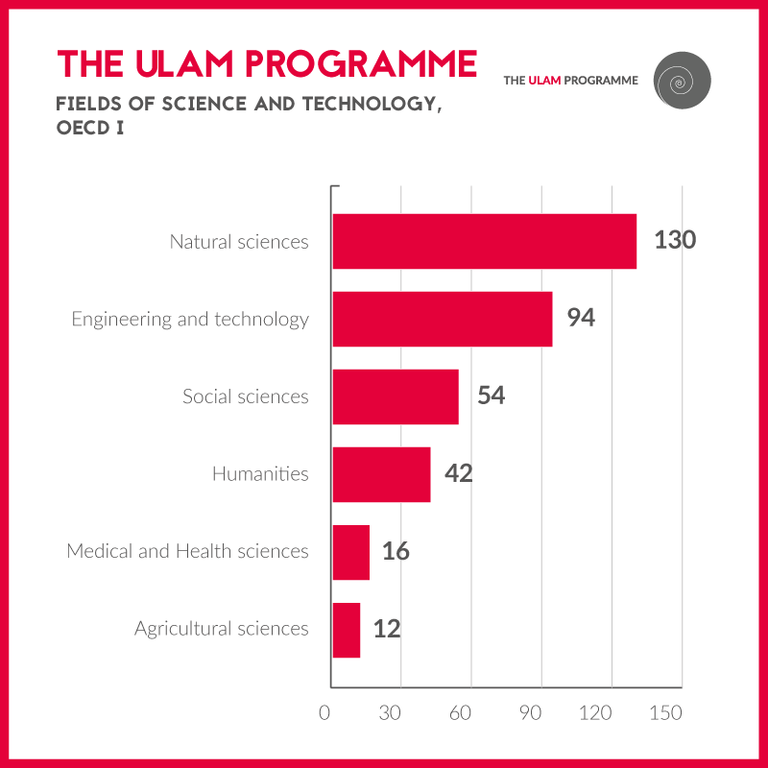
As for programmes for outgoing scientists, that is the Bekker Programme and the Walczak Programme, we received 465 and 22 applications, respectively.
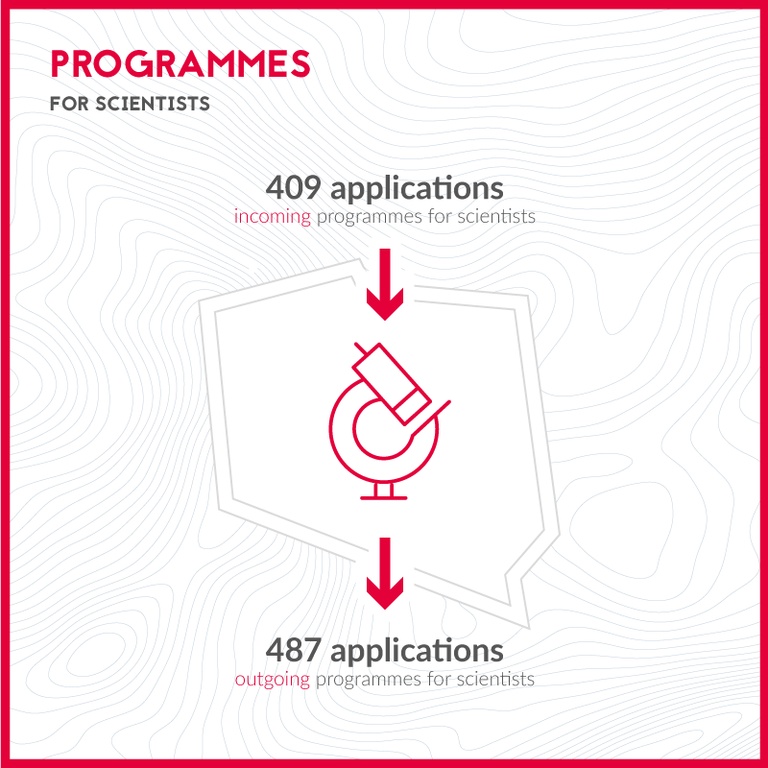
In terms of programmes for institutions, we called for applications under the programme KATAMARAN – Establishing and Conducting Joint Second-cycle Studies. Here, 13 applications for the total sum of PLN 10,413,174.06 were submitted. The projects that have been granted funding will be carried out in cooperation with universities from the following countries: Portugal, Ukraine, Belarus, Italy, Spain, Germany, Kazakhstan, and Russia.
On account of the epidemiological situation, the period for the completion of the projects under the programmes International Alumni, Foreign Promotion Programme, International Academic Partnerships, Welcome to Poland and PROM – International Scholarship Exchange of PhD Candidates and Academic Staff was prolonged.
As many as 118 applications were registered in the CEEPUS qualification of academic networks for the academic year 2020/2021. Out of this number, 85 were selected and will be carried out at 16 higher education institutions in the CEEPUS countries in Central Europe. With 165 participating establishments, Poland currently ranks first in terms of the number of accepted network coordinators and partners.
At the beginning of June, we announced calls for applications: in a new programme for foreign scientists – NAWA Chair – and in a programme for institutions – STER Internationalisation of Doctoral Schools, which has changed its form this year. Apart from that, we completed a new offer for students last month, that is the Foundation Courses for Entering Education in Poland. Applications can be submitted by public and non-public higher education institutions which have the necessary experience and organisational potential to carry out courses that will prepare foreigners to study in Poland.
It was likewise in June that we announced the results in the Iwanowska Programme for outgoing PhD students. Scholarships have been granted to top 66 doctoral students, who will visit renowned research centres abroad. The scholarships will cover the costs of their stay. The most popular destinations for young scientists are the United States (18), Italy (8), Germany (7), Switzerland (4), the United Kingdom (4), Denmark (3), and France (3).
In January and at the beginning of March, we held language certificate exams at the levels B1, B2 and C1. Ever more candidates take the exams each year. The number of people who sat the exam in January was 1793, and in March – 2859.
At the end of 2019, we launched a new system – KWALIFIKATOR, which allows the users to automatically generate general information about selected types of higher education diplomas obtained abroad. Currently, the system enables the verification of 314 diplomas from 31 states. Kwalifikator was used 6091 times over the first half of the year: 3800 users obtained 8042 pieces of general information about diplomas. The system’s users came from 96 countries from 6 continents.
Prior to the announcement of the state of epidemic, we participated in three meetings aiming to present our offer to higher education institutions as part of a cycle of meetings titled ‘Day with NAWA.’ The meetings were held in Katowice, Opole and Warsaw. We organised nearly ten webinars in which we informed about our programmes and the application procedure, as well as webinars on subjects relevant for our recipients. For instance, the online meeting titled ‘Hosting Foreign Scientists – Visas and Legalisation of Stay’ gathered more than 400 registered participants (event materials). Another cyclic event organised by us, namely Direct to Internationalisation, went online, as well.
And what happened with activities related to the campaign Ready, Study, Go! Poland? Here, we began the year with joining the Instagram, where we now have almost 1000 followers! Although we had intended to take part in major education fairs and professional events along with Polish universities, we managed to go on only three of the planned education missions. As early as in January, NAWA and nine HEIs went to the International Education Show in the United Arab Emirates. In February, together with as many as 19 HEIs, we took part in an education fair in Tbilisi – the International Education Fair 2020. The last event we organised was the education mission to Latin America (Mexico and Colombia), on which we were accompanied by eight universities. All the fair events involved additional activities, e.g. we organised meetings at local universities or Polish diplomatic posts.
Even though we visited only four countries physically, we reached a much greater number virtually! As part of the campaign, NAWA was present at virtual fairs and at the NAFSA Conference. In addition, we attended The Student World Virtual Fair at the beginning of June – an online fair for the Indian subcontinent. Over the course of four hours, our virtual stand was visited by approximately 200 candidates interested in studying in Poland. Moreover, we took part in a virtual fair dedicated to the Latin American market. Another event in June was the webinar Ready, Study, Go! Poland – Studying & Research Opportunities for Indonesia, which we organised in cooperation with the Polish Embassy in Jakarta.
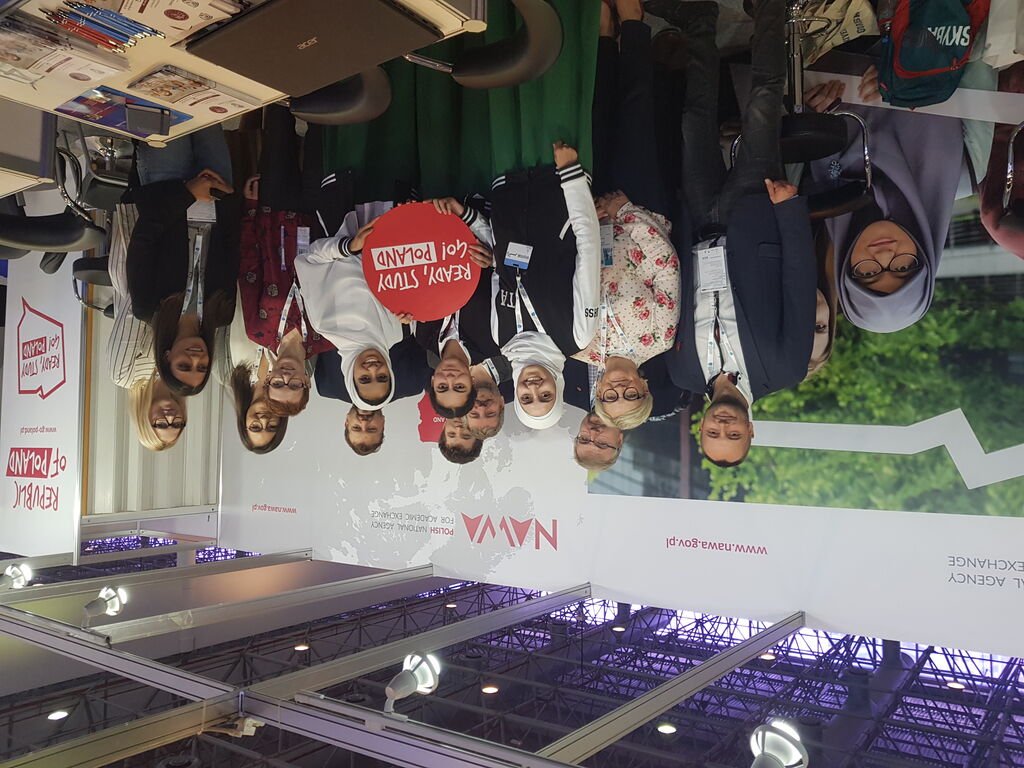
NAWA on an Education Mission to the UAE
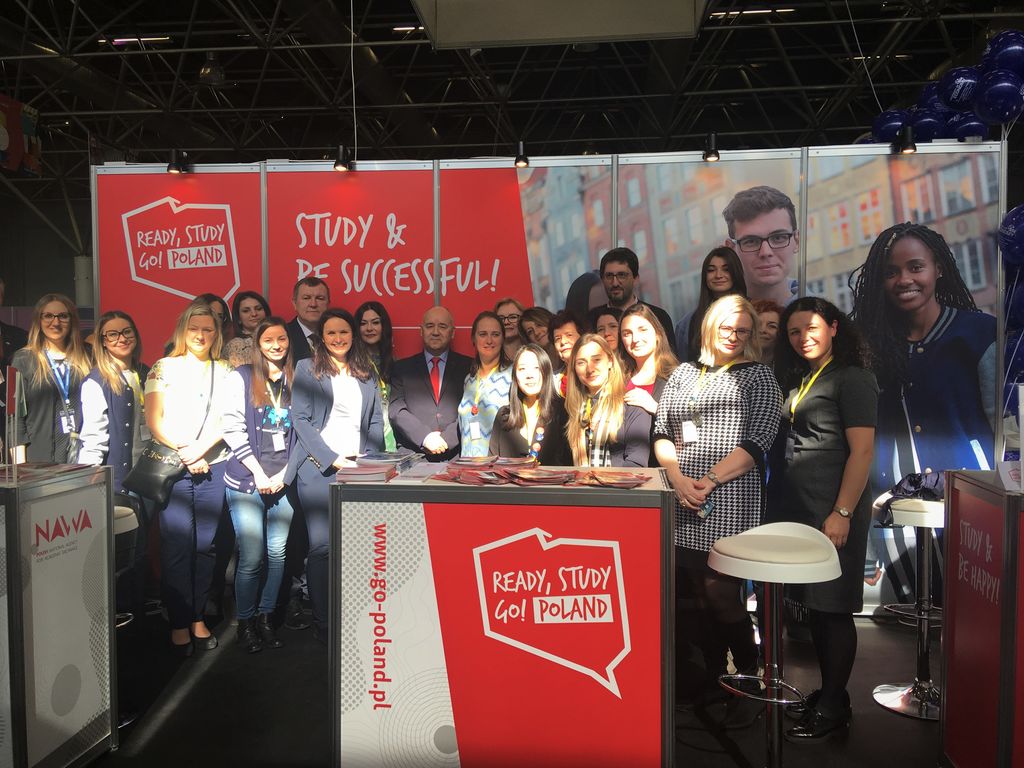
NAWA on an Education Mission to Georgia
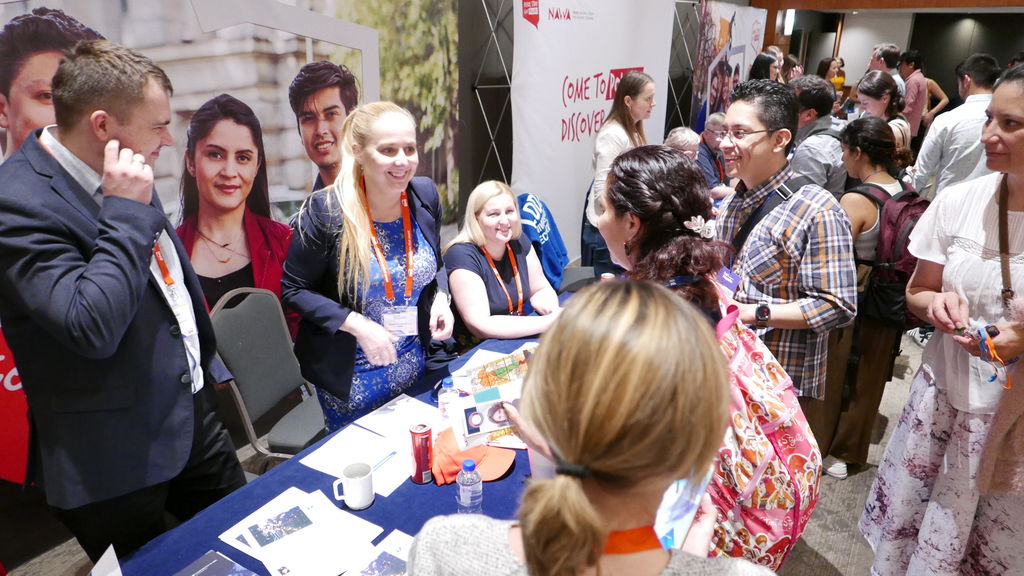
NAWA on an Education Mission to Latin America
The new year meant also the launch of a new project: Digital Ambassadors Ready, Study, GO! Poland. The so called ‘digital’ ambassadors of Poland are a group of 18 persons from 20 countries, former or current students at Polish universities, often NAWA beneficiaries, who use their experience to help promote studies in Poland abroad.
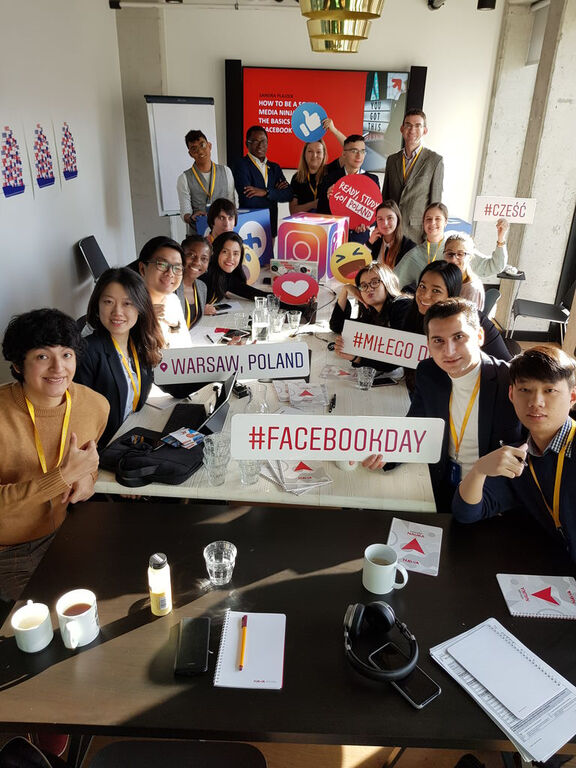
The first meeting and training for the Digital Ambassadors
The above part of the summary already contains information on the measures we took up in connection with the COVID-19 pandemic. Yet that is not all. Having decided that the worst that could happen to our beneficiaries and scholarship candidates was an information gap or misinformation, we decided to keep everyone informed on an ongoing basis about all the steps taken in connection with the situation of the academic world, particularly in the context of mobility. We placed a special yellow banner and a special tile ‘Important information COVID-19’ on NAWA’s homepage. In addition, foreign students could find the English translations of all official announcements on the website www.go-poland.pl. All measures we took were guided by the recommendations of the Ministry of Health and the Chief Sanitary Inspectorate. We cooperated with the Ministry of Science and Higher Education in order to amend the regulations of our programmes so as to adapt them flexibly to the new conditions. We continue to monitor the situation and we reserve the right to change the way projects are carried out in the event of a situation that could significantly affect the health and safety of our beneficiaries, partners, staff and citizens.
Taking the difficult situation into consideration, we prepared special support for foreign students – NAWA scholarship holders. Financial support is available to students who have found themselves in financial distress due to the COVID-19 pandemic. We received 1413 applications for this one-off aid. Support was granted to 1152 applicants.
Seeing the vast number of initiatives offered by the Polish universities, we decided to gather them all in one place. We created the database and invited higher education institutions to send us information about their activities. Moreover, we organised a cycle of online meetings Ready, Study, Go! Poland for Students in Poland. The nine webinars held so far featuring lecturers and experts were carried out for foreign students whose language skills were insufficient to participate in all webinars offered by their universities.
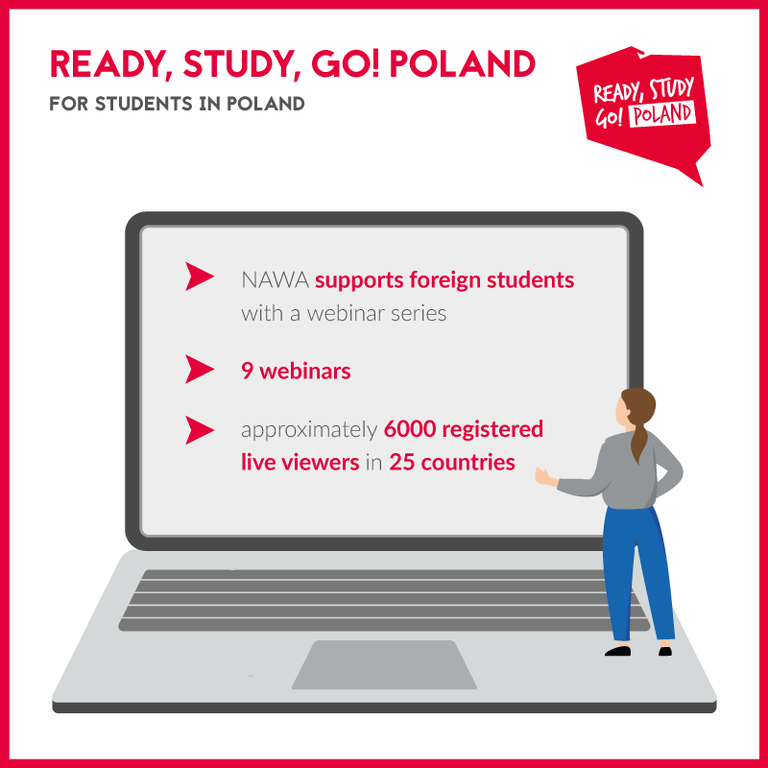
In the cycle The Science Must Go On, we demonstrated that science had not stopped in its tracks, either. We presented the profiles of NAWA beneficiaries, who showed online how their work looks like at the moment and what it is that they do.
The summary of the most important activities from the past six months seems extensive, yet we did considerably more than that. The COVID-19 pandemic forced us to redefine our daily operation as well as objectives and methods of their completion. The current situation shows us every day how deeply the world of science is connected to our health and safety, and how rapidly the world as we know it can come to a standstill. Yet although the world halted, we kept going. The coronavirus does not know the concept of boundaries. This is a crucial statement, because it makes us aware that our fight against the virus has to cross the boundaries, too. That is something we can achieve through cooperation and mutual understanding.
We are happy that despite difficulties faced by the academic and scientific world, we have weathered this time and continue to work with undiminished energy for the sake of internationalisation of higher education and access to education for all.
We wish to thank all who are with us, who have demonstrated their trust by submitting applications in our programmes, and who follow us and support our activities.










